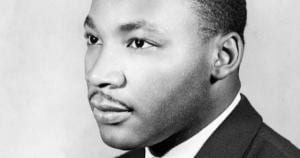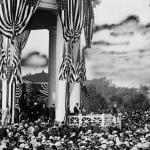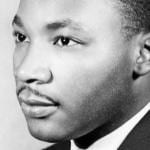 Martin Luther King was a pastor descended from pastors. Recall that when King was introduced at the March on Washington, he was the Reverend, the doctorate was unmentioned. As a brilliant preacher, the son of a great pastor (Daddy King), Martin Luther King gained much of his moral authority from the African-American church.
Martin Luther King was a pastor descended from pastors. Recall that when King was introduced at the March on Washington, he was the Reverend, the doctorate was unmentioned. As a brilliant preacher, the son of a great pastor (Daddy King), Martin Luther King gained much of his moral authority from the African-American church.
The start of the academic year at The College finds me reading King with ears to hear, beginning near the end of his ministry with The Drum Major Instinct.
This is one of King’s last sermons (available to me) and as a text is more uneven than some of his best sermons, quoting a long section from that old pastoral standby One Solitary Life. Yet, as always, there is much to learn, prophetic insight, an error or two (perhaps?), and, as always, a reminder that the way of a follower of Jesus is the way of service through love. No Christian can disagree on this, but most of us forget to do it. God help us. Some thoughts on the sermon:
King suggests that we have a “drum major instinct” that is often destructive, but can motivate us to become great in love.
King begins with this key text:
“But so shall it not be among you: but whosoever will be great among you, shall be your servant: and whosoever of you will be the chiefest, shall be servant of all.”
King cautions us not to condemn the disciples too quickly for asking to be “chief.” He uses “drum major:” that person that marches at the front a parade. Most of us do not know the hard work the drum major does, but we envy the uniform and the prominence while ignoring the work.
It’s a kind of drum major instinct—a desire to be out front, a desire to lead the parade, a desire to be first. And it is something that runs the whole gamut of life.
King is too thoughtful simply to condemn this desire, because good deeds should receive recognition. The good behind the drum major instinct is a desire for love.
There comes a time when the drum major instinct can become destructive. And that’s where I want to move now.
Reverend King says we can see the drum major spirit in five destructive characteristics:
- Boasting
- Name Dropping
- Anti-social behavior
- Putting other people down
- Snobbish exclusivist (classism)
Against all of this, King says the church of Jesus must be a whosoever will church.
When the church is true to its nature, it says, “Whosoever will, let him come.” And it [is] not supposed to satisfy the perverted uses of the drum major instinct. It’s the one place where everybody should be the same, standing before a common master and savior. And a recognition grows out of this—that all men are brothers because they are children of a common father.
An example of the church failing is race prejudice, much motivated by “perverted use” of the drum major spirit:
Do you know that a lot of the race problem grows out of the drum major instinct? A need that some people have to feel superior. A need that some people have to feel that they are first, and to feel that their white skin ordained them to be first. And they have said over and over again in ways that we see with our own eyes.
King, being King, acts as a prophet applying this spirit to the Cold War:
But this is why we are drifting. And we are drifting there because nations are caught up with the drum major instinct. “I must be first.” “I must be supreme.” “Our nation must rule the world.” And I am sad to say that the nation in which we live is the supreme culprit. And I’m going to continue to say it to America, because I love this country too much to see the drift that it has taken. God didn’t call America to do what she’s doing in the world now. God didn’t call America to engage in a senseless, unjust war as the war in Vietnam. And we are criminals in that war. We’ve committed more war crimes almost than any nation in the world, and I’m going to continue to say it. And we won’t stop it because of our pride and our arrogance as a nation.
King was, of course, opposed to communism generally.*As a pastor, King was right to apply the teachings of Scripture to the conflicts of the day. He took strong stands against the War in Vietnam.* Whatever our views about his particular application, we must pause. Have we adopted our position due to a “drum major spirit?” Do we simply wish our team to win? There were obviously those who opposed the Reds out of sheer jingoism or a desire for personal power or affluence.
Against this twisted drum major spirit King placed the transforming work of Jesus:
And so Jesus gave us a new norm of greatness. If you want to be important—wonderful. If you want to be recognized—wonderful. If you want to be great—wonderful. But recognize that he who is greatest among you shall be your servant. That’s a new definition of greatness.
Amen.
You should listen to the entire sermon, because once King reaches this bold expression of the Gospel, his new definition of greatness, the Spirit takes this sermon, which had plodded at times, to greatness. The Spirit leads King to profound personal insight. He begins to speak of his own death, his funeral, the eulogizing that would take place.
King knew he was under threat. He kept pressing his ministry forward and this was making him new friends and new enemies. If you listen to the congregation during this sermon, he receives more agreement, more response, in some sections than others, but the African American church had the resources theologically and experientially to let their pastor grow and change. They kept listening. He needed help and mentors like his father (Martin Luther King Sr) stood with him.
Preached just a few months before died, King sets a standard for himself that every Christian should emulate:
Yes, if you want to say that I was a drum major, say that I was a drum major for justice. Say that I was a drum major for peace. I was a drum major for righteousness. And all of the other shallow things will not matter. I won’t have any money to leave behind. I won’t have the fine and luxurious things of life to leave behind. But I just want to leave a committed life behind. And that’s all I want to say.
And, God helping me, that’s all I want to say.
Listen to the entire sermon.
——————————————————
I have written about Rev. Dr. King (and his father!) several times. (Hopefully many of the obvious questions you might ask me regarding my opinions on Rev. Dr. King will be answered in the links.
*There were reasons to fight the Cold War that were not “the drum major spirit.” The millions who fled Easter Europe and the Soviet Union, there was no equivalent flight to the communist states, opposed communism out love and not a desire to be “first” in power. I have strong differences with Rev. Dr. King here, but before rushing to think about this. I must stop, consider first where I might be wrong (!), and what I can learn even if I am right on this particular point.
Otherwise, I might be manifesting a perversion of the drum major spirit.
Series part 1.












